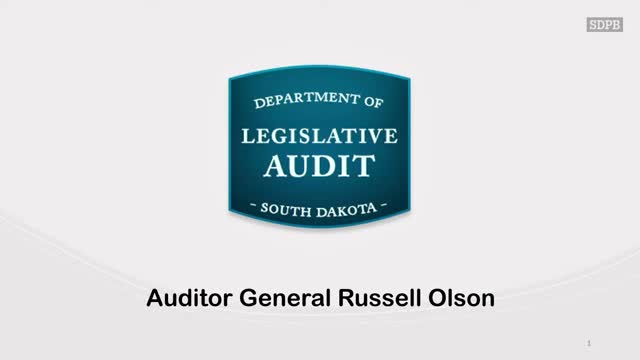Auditor General asks Legislature for pay increases, two FTEs to retain auditors and expand fraud detection
Get AI-powered insights, summaries, and transcripts
Subscribe
Summary
Auditor General Russell Olson told the Joint Legislative Appropriations Committee that the Legislative Audit office needs higher starting salaries, targeted merit increases and two additional full‑time positions to retain experienced auditors and strengthen fraud detection.
Auditor General Russell Olson told the Joint Legislative Appropriations Committee that the Legislative Audit office needs higher starting salaries, targeted merit increases and two additional full‑time positions to retain experienced staff and expand fraud detection and analytic work.
Olson said the office asked the executive board to increase the starting salary for an Auditor I from $62,000 to $64,000, to approve a performance pool that could provide raises up to 3.75 percent, and to continue bonuses tied to professional certifications. He said the executive board approved $124,342 in additional salary and benefit authority; the governor's recommended budget did not include those specific salary requests but did propose $319,452 and two additional FTE for Legislative Audit.
Why it matters: Olson said losing trained auditors makes it harder to operate the office and train new hires; Legislative Audit performs statewide financial and compliance audits, internal control reviews and special engagements that the office says improve government accountability and support local governments.
Olson described the office's funding and workload. Legislative Audit is a nonpartisan legislative department whose responsibilities are defined in SDCL chapter 4‑2 (Department of Legislative Audit) and SDCL 4‑11 (post audit of accounts). Olson said his office bills for assurance services and returned about $2,320,000 to the general fund and collected about $820,000 through memo billing for state accounts.
On staff and recruiting, Olson said Legislative Audit is authorized for 42 FTE and that retaining experienced auditors is difficult because private firms and agencies can pay more. He described personnel tools the office uses: an increased starting salary offer, scheduled mid‑probation progression increases (3% every six months during the first two years), certification bonuses, and a performance‑based progression pool. He told the committee, “If you find a problem, find an answer. Tell them how to fix it.”
Fraud detection and prevention was a central line of questioning. In response to lawmakers, Olson outlined steps the office takes after frauds are discovered: post‑event reviews that adjust audit testing; more face‑to‑face engagement with agency staff; targeted data analytics for anomalies; and encouraging tips by maintaining an anonymous fraud, waste and abuse reporting portal on the Legislative Audit website. He cited national research and told the committee, “Tips are basically one of the largest detectors of fraud — 43% of the time a tip sets off a fraud.” He said internal audit and management review are the next most common detectors.
Lawmakers pressed for specifics about how Legislative Audit could catch long‑running, low‑value schemes that normalize over time. Olson said those schemes can blend into regular patterns and are harder to spot by analytics alone; the office is increasing data work and face‑to‑face fraud discussions with agency employees and said additional specialized FTE would permit deeper analytic reviews.
Other points from Olson's presentation: - Legislative Audit provides internal control reviews for small municipalities and offers technical assistance so local governments call the office for guidance rather than paying outside consultants. - The auditor general is appointed for an eight‑year term and the office operates independently of the executive branch to meet professional audit standards. - The office requires staff continuing professional education (80 hours per two years) and uses a mix of recruitment and retention strategies including certification pay and longevity pay.
Committee discussion ranged from the amount and design of the requested salary increases to how Project Bison (the state ERP update) and better agency systems could aid fraud detection. Olson said an improved ERP will give analysts better tools and could provide more built‑in controls, but that detection still requires strong tone at the top and active reporting by employees.
Ending: Olson told the committee he would present details to the executive board for distribution and policy approval; he said the office appreciates legislative attention to staffing and that additional funds would be used subject to executive board oversight.
